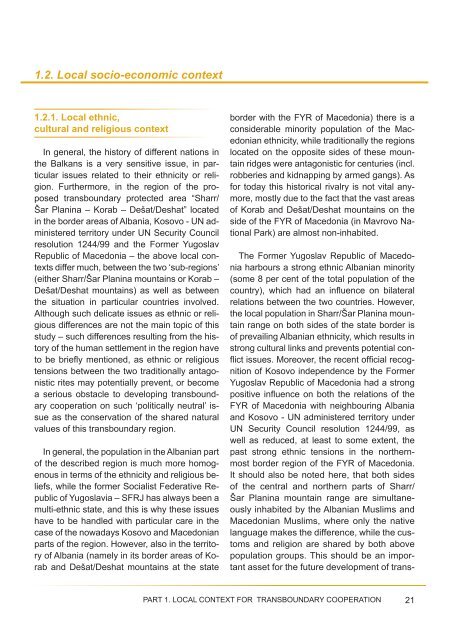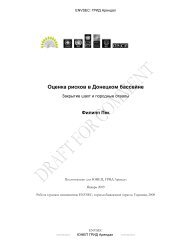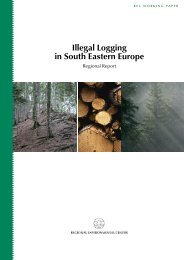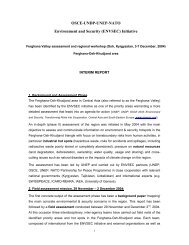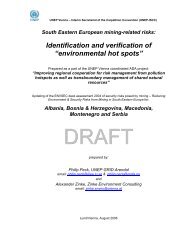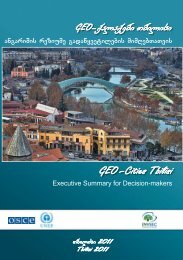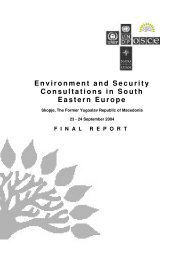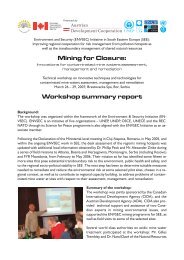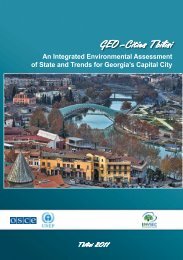sharr/šar planina – korab – dešat/deshat - UNEP Vienna ISCC
sharr/šar planina – korab – dešat/deshat - UNEP Vienna ISCC
sharr/šar planina – korab – dešat/deshat - UNEP Vienna ISCC
You also want an ePaper? Increase the reach of your titles
YUMPU automatically turns print PDFs into web optimized ePapers that Google loves.
1.2. Local socio-economic context1.2.1. Local ethnic,cultural and religious contextIn general, the history of different nations inthe Balkans is a very sensitive issue, in particularissues related to their ethnicity or religion.Furthermore, in the region of the proposedtransboundary protected area “Sharr/Šar Planina <strong>–</strong> Korab <strong>–</strong> Dešat/Deshat” locatedin the border areas of Albania, Kosovo - UN administeredterritory under UN Security Councilresolution 1244/99 and the Former YugoslavRepublic of Macedonia <strong>–</strong> the above local contextsdiffer much, between the two ‘sub-regions’(either Sharr/Šar Planina mountains or Korab <strong>–</strong>Dešat/Deshat mountains) as well as betweenthe situation in particular countries involved.Although such delicate issues as ethnic or religiousdifferences are not the main topic of thisstudy <strong>–</strong> such differences resulting from the historyof the human settlement in the region haveto be briefly mentioned, as ethnic or religioustensions between the two traditionally antagonisticrites may potentially prevent, or becomea serious obstacle to developing transboundarycooperation on such ‘politically neutral’ issueas the conservation of the shared naturalvalues of this transboundary region.In general, the population in the Albanian partof the described region is much more homogenousin terms of the ethnicity and religious beliefs,while the former Socialist Federative Republicof Yugoslavia <strong>–</strong> SFRJ has always been amulti-ethnic state, and this is why these issueshave to be handled with particular care in thecase of the nowadays Kosovo and Macedonianparts of the region. However, also in the territoryof Albania (namely in its border areas of Koraband Dešat/Deshat mountains at the stateborder with the FYR of Macedonia) there is aconsiderable minority population of the Macedonianethnicity, while traditionally the regionslocated on the opposite sides of these mountainridges were antagonistic for centuries (incl.robberies and kidnapping by armed gangs). Asfor today this historical rivalry is not vital anymore,mostly due to the fact that the vast areasof Korab and Dešat/Deshat mountains on theside of the FYR of Macedonia (in Mavrovo NationalPark) are almost non-inhabited.The Former Yugoslav Republic of Macedoniaharbours a strong ethnic Albanian minority(some 8 per cent of the total population of thecountry), which had an infl uence on bilateralrelations between the two countries. However,the local population in Sharr/Šar Planina mountainrange on both sides of the state border isof prevailing Albanian ethnicity, which results instrong cultural links and prevents potential conflictissues. Moreover, the recent offi cial recognitionof Kosovo independence by the FormerYugoslav Republic of Macedonia had a strongpositive infl uence on both the relations of theFYR of Macedonia with neighbouring Albaniaand Kosovo - UN administered territory underUN Security Council resolution 1244/99, aswell as reduced, at least to some extent, thepast strong ethnic tensions in the northernmostborder region of the FYR of Macedonia.It should also be noted here, that both sidesof the central and northern parts of Sharr/Šar Planina mountain range are simultaneouslyinhabited by the Albanian Muslims andMacedonian Muslims, where only the nativelanguage makes the difference, while the customsand religion are shared by both abovepopulation groups. This should be an importantasset for the future development of trans-PART 1. LOCAL CONTEXT FOR TRANSBOUNDARY COOPERATION 21


